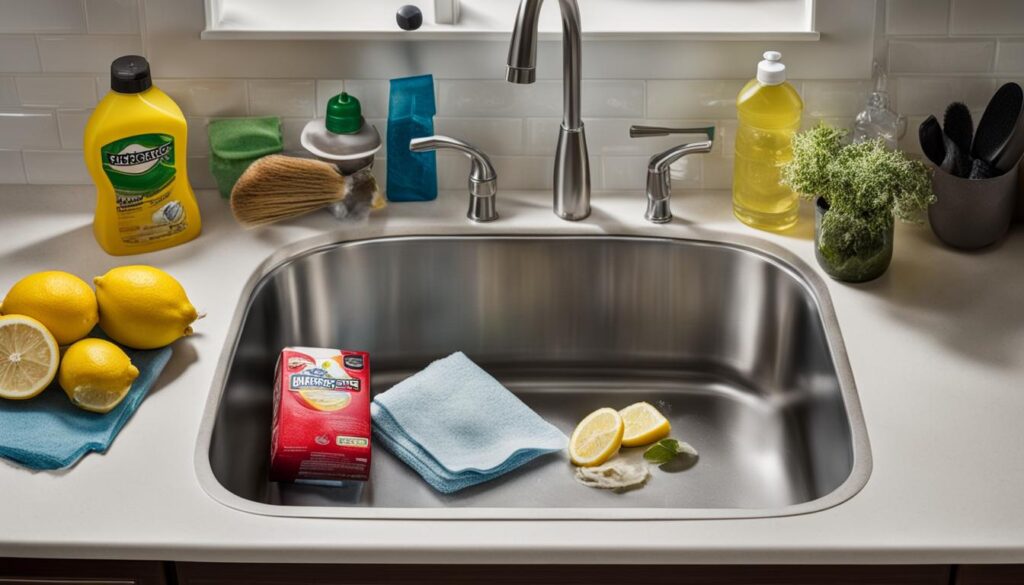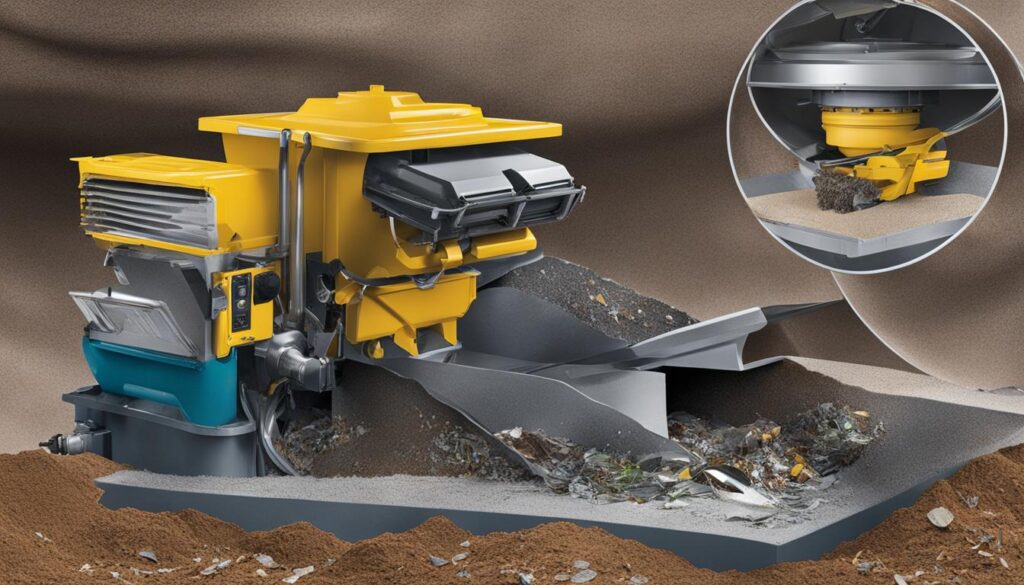Not all drain cleaners are meant for your garbage disposal. Drain cleaners are formulated using harsh chemicals that can damage the inside lining of your pipes. This can lead to pipe breakage and leaks. It is safer to avoid using drain cleaner in your garbage disposal and opt for alternative methods to unclog it.
Key Takeaways:
- Using drain cleaner in your garbage disposal can damage the pipes and cause leaks.
- It is safer to avoid using drain cleaner and opt for alternative methods to unclog the disposal.
- Alternative solutions include plunging the sink, using boiling water to melt grease, and practicing proper maintenance.
- Avoid putting items in the disposal that can cause clogs or damage, such as grease, fibrous scraps, and non-food items.
- Proper usage guidelines should be followed to prevent clogs and keep the disposal running smoothly.
Alternative Solutions for a Clogged Garbage Disposal
If you’re dealing with a clogged garbage disposal, there are alternative solutions that are safer and more effective than using drain cleaner. Not only will these methods unclog your disposal, but they will also help maintain its longevity. Here are a few alternatives to consider:
1. Plunging the Sink
One of the easiest and most effective ways to unclog a garbage disposal is by using a plunger. Similar to unclogging a toilet, you’ll need to create a tight seal around the drain opening with the plunger. Then, gently push and pull on the plunger to create suction. This action will help dislodge any stubborn food particles or debris that may be causing the clog. After a few plunges, run water down the disposal to see if the clog has been cleared.
2. Boiling Water Method
Another simple solution for a clogged garbage disposal is using boiling water. Start by boiling a pot of water. Once boiling, carefully pour the water into the disposal while it’s running. The hot water will help melt away any grease or oil buildup that may be causing the clog. Be cautious when handling boiling water and ensure it is poured directly into the disposal, avoiding any other surfaces.
3. Proper Maintenance
To prevent future clogs in your garbage disposal, it’s essential to practice proper maintenance. Avoid putting certain items down the disposal, such as grease, fibrous scraps (like celery or onion skins), coffee grounds, and non-food items. Additionally, regularly clean your disposal by running cold water and grinding ice cubes or citrus peels. This will help keep your disposal clean and free of buildup, reducing the risk of clogs.
By implementing these alternative solutions and following best practices for garbage disposal maintenance, you can keep your disposal running smoothly and avoid the need for potentially damaging drain cleaners. Remember, prevention and proactive care are key to maintaining a long-lasting and functional garbage disposal.

Understanding Garbage Disposals and How They Get Clogged
If you’ve ever wondered how garbage disposals work and how they can become clogged, this section will provide you with the answers. Garbage disposals are designed to break up food scraps and help prevent drain clogs. However, certain items should never be put down a garbage disposal, as they can cause clogs and damage to the disposal itself.
How do garbage disposals work?
A garbage disposal is a motorized appliance installed under your kitchen sink that grinds up food waste into tiny particles. When you turn on the disposal, the motor rotates a sharp impeller plate, which forces the food waste against a stationary grind ring. The food waste is then pulverized into small pieces, allowing it to flow easily through the drain pipes.
Most garbage disposals have a built-in shredder ring that helps break down tough food scraps. This shredder ring works in conjunction with the impeller plate to ensure effective grinding and disposal of the waste. Once the food waste is ground up, it is flushed out of the disposal and into your home’s wastewater system.
How do garbage disposals get clogged?
While garbage disposals are designed to handle most food scraps, there are certain items that can lead to clogs and damage. Fibrous scraps, such as celery, artichokes, and potato peels, can wrap around the impeller plate and jam the disposal. Grease and oils can solidify and create a sticky residue, trapping other food particles and causing clogs. Coffee grounds can accumulate and form a sludgy mass, obstructing the flow of water. Additionally, non-food items like utensils or bones should never be put down a garbage disposal, as they can damage the motor and impeller plate.
It is important to follow proper usage guidelines for your garbage disposal and to avoid putting anything in it that shouldn’t be there. By doing so, you can prevent clogs, damage, and the need for costly repairs.

Table: What can you put down a garbage disposal?
| Allowed | Not Allowed |
|---|---|
| Citrus peels | Celery |
| Fruit scraps | Artichokes |
| Small bones | Potato peels |
| Eggshells | Grease |
| Soft vegetables | Coffee grounds |
| Leftover cooked meat | Non-food items |
By referring to this table, you can easily determine what can and cannot be safely put down a garbage disposal. Remember to always run cold water while operating the disposal and to avoid overloading it with large quantities of food waste. Practicing proper maintenance and using the disposal correctly will help keep it running smoothly and avoid unnecessary clogs and repairs.
Conclusion
After considering the potential risks of using drain cleaner in a garbage disposal, it is clear that this is not a recommended solution. The harsh chemicals in drain cleaners can cause damage to the inside lining of your pipes, leading to pipe breakage and leaks. It is important to prioritize the safety and longevity of your plumbing system.
Instead, there are safer alternatives to unclog a garbage disposal. Start by plunging the sink yourself, as this can often dislodge any clogs. Another effective method is to pour boiling water down the drain to melt away grease and debris. Additionally, practicing regular maintenance can help prevent clogs in the future.
Remember, there are certain items that should never be put down a garbage disposal. Fibrous scraps, grease, coffee grounds, and non-food items can all cause clogs and damage the disposal. By following best practices and avoiding these items, you can ensure the smooth operation of your garbage disposal.
To summarize, prioritize drain cleaner safety, maintain your garbage disposal regularly, and be mindful of what you put down the drain. By following these simple tips, you can keep your garbage disposal in top shape and avoid unnecessary clogs and damage to your plumbing system.
FAQ
Can you put drain cleaner in a garbage disposal?
It is not recommended to put drain cleaner in a garbage disposal as it can damage the pipes.
What are the alternative solutions for a clogged garbage disposal?
Alternative solutions include plunging the sink, using boiling water to melt grease, and practicing proper maintenance.
What should not be put in a garbage disposal?
Fibrous scraps, grease, coffee grounds, and non-food items should not be put in a garbage disposal as they can cause clogs and damage the unit.
How do garbage disposals work?
Garbage disposals are designed to break up food scraps and minimize drain clogs.
How do garbage disposals get clogged?
Garbage disposals can get clogged when items such as fibrous scraps, grease, coffee grounds, and non-food items are put down the disposal.
It is best to avoid using drain cleaner in a garbage disposal and opt for safer alternatives. Proper maintenance and avoiding items that can cause clogs or damage are key to keeping your garbage disposal running smoothly.